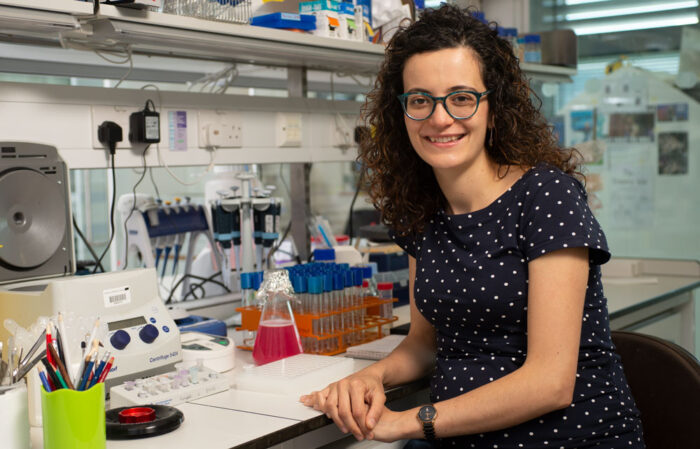
Marta Shahbazi, from the LMB’s Cell Biology Division, has been announced as the joint winner of the 2019 3Rs prize in recognition of her work describing the use of 3D tissue cultures that mimic embryo development at implantation and beyond, providing an opportunity to replace and reduce the use of mice in some developmental biology studies. The 3Rs prize is awarded by the National Centre for the Replacement, Refinement, and Reduction of Animals in Research (NC3Rs) and sponsored by GSK.
The winners were announced during a live webinar chaired by Professor Kevin Shakesheff, chair of the NC3Rs board, on Wednesday 10 June, featuring video presentations from Marta and a co-winner, Francesca Nunn, followed by a live Q&A.
Video recording of the live virtual 2019 International 3Rs prize announcement (10 June 2020).
Prize announcement at 5:50, introduction to Marta’s prize winning research at 8:00, Marta’s presentation on her prize-winning research at 21:45, Q&A at 32:00. Credit NC3Rs.
Marta set up her group at the LMB at the start of 2020 to investigate how the three-dimensional organization of a tissue affects stem cell fate decisions. The 3Rs prize recognises her work with Magdalena Zernicka-Goetz at the Department of Physiology, Development and Neuroscience, University of Cambridge, on the development of advanced cultures of human and mouse embryonic stem cells and human embryos that reliably mimic the development of the embryo at the time of, and beyond, implantation.
Implantation of an embryo into the uterus is a critical step with a high rate of pregnancies lost at this stage. Studying implantation and other early embryonic events is technically and ethically challenging. Marta’s research showed that it is possible to study this critical stage of development in vitro, reducing the use of mice in this work.
The winning paper, published in Nature in 2017, revealed an unknown link between cell potency and tissue shape, providing the first mechanistic understanding of how human embryos become remodelled at the time of implantation. Importantly, by demonstrating that these 3D cultures can be used to answer fundamental biological questions, the research has led to many groups worldwide adopting the system, further reducing the use of animals.
After receiving the prize, Marta commented, “With the support of the LMB and the 3Rs, I plan to develop a platform to study gene function in human embryos. This will allow us to determine the mechanisms of human development at the time of implantation, and to understand why so many pregnancies fail at this stage”.
The 3Rs prize, sponsored by GSK, is awarded annually by the NC3Rs to recognise work, published in the previous three years, that has a major impact on the replacement, reduction and refinement of the use of animals in research. The competition is open to any research team in the world and applications are assessed by an expert panel.
Marta is the second member of LMB to win the 3Rs prize: Madeline Lancaster shared the 2015 3Rs Prize for her work on a 3D model of the embryonic human brain created from stem cells that minimises the use of animals in medical research.
Further references
Marta’s group page
Prize winning paper: Pluripotent state transitions coordinate morphogenesis in mouse and human embryos. Shahbazi, MN., Scialdone, A., Skorupska, N., Weberling, A., Recher, G., Zhu, M., Jedrusik, A., Devito, LG., Noli, L., Macaulay, IC., Buecker, C., Khalaf, Y., Ilic, D., Voet, T., Marioni, JC., Zernicka-Goetz, M. Nature 552: 239 – 243
National Centre for the Replacement, Refinement and Reduction of Animals in Research (NC3Rs)
NC3Rs press release
NC3Rs 3Rs Prize announcement webinar recording